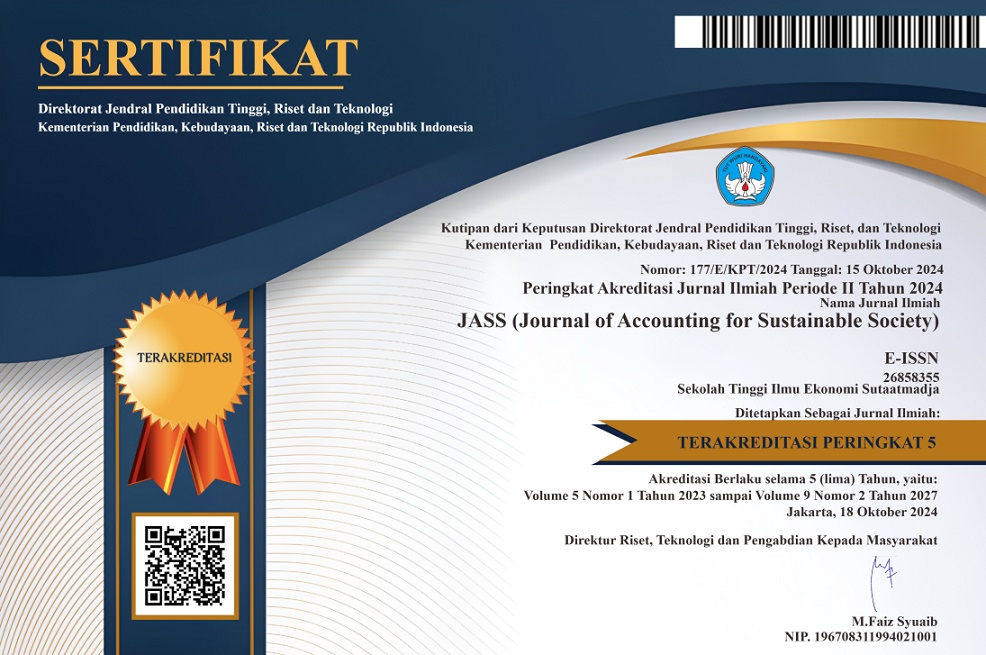FACTORS THAT INFLUENCE IMPULSIVE BUYING
DOI:
https://doi.org/10.35310/jass.v3i02.891Abstract
This study aims to determine the factors that influence impulsive buying either partially or simultaneously. The data used in this study is primary data by distributing questionnaires in the form of google form. The method used in sampling is probability sampling method with convenience sampling technique and the number of samples in this study were 200 respondents, who were college students and students majoring in accounting in Subang Regency. The data was processed using data quality test methods, different tests, classical assumption tests, multiple regression analysis, and hypothesis testing. The results showed that partially the neuroticism and extraversion variables had a positive and significant effect on impulsive buying. While the mental accounting and conscientiousness variables have no effect on impulsive buying. Simultaneously, the results showed that the variables of mental accounting, conscientiousness, neuroticism, and extraversion simultaneously influenced impulsive buying.
References
Amos, C., Holmes , R., & Keneson, W. (2014). Sebuah Meta-Analisis Konsumen Impulsif Membeli . Jurnal Ritel dan Layanan Konsumen.
Astutik, P. P., Chushiyah, T., & Viatrie, D. I. (2020). Kepribadian Big Five terhadap Impulsive Buying Behaviour pada Mahasiswi Fakultas Ekonomi dan Bisnis. Journal An-Nafs: Kajian Penelitian Psikologi .
Cahyani, P., Alsa, A., & Heimi, A. F. (1999). Gaya Kelekatan dan Kemarahan. Jurnal Psikologi.
Chan, D. (2006). Interactive Effects Of Situational Judgment Effectiveness And Proactive Personality On Work Perceptions And Work Outcomes. Journal of Applied Psychology.
Dirgayunita, A. (2016). Depresi: Ciri, Penyebab dan Penangannya. Journal An-nafs.
Eldista,Elsa., Sulistiyo, Agung B., & Hisamuddin, Nur. (2019). Mental Accounting: Memaknai Kebahagiaan Dari Sisi Lain Gaya Hidup Mahasiswa Kos. Jurnal Akuntansi Universitas Jember
Eysenck, S. B., Eysenck, H. J., & Barrett, P. (1985). A Revised Version of The Psychoticism Scale. Personality and Individual Differences.
Farid, D. S., & Ali, M. (2018). Effects of Personality on Impulsive Buying Behavior: Evidence from a Developing Country. AIMI journals, 33-34.
Feist, J., & Feist, G. (2010). Teori Kepribadian 2. Jakarta: Salemba Humanika.
Fitriana, Q. A. (2013). Peran Kecenderungan Kepribadian Neuroticism Dan Problem Focused Coping Dalam Menjelaskan Stres Akademik Pada Mahasiswa Tingkat Akhir Fakultas Ilmu Sosial Dan Ilmu Politik Universitas Brawijaya. Malang: Universitas Brawijaya Malang.
Hartini, S. (2020, 01 27). Fakultas Psikologi UIN Syarif Hidayatullah Jakarta. Retrieved 10 26, 2020, from Pingin Tahu, Mengapa Mahasiswa UIN Jakarta Memiliki Perilaku Impulsive Buying?: http://psikologi.uinjkt.ac.id/pingin-tahu-mengapa-mahasiswa-uin-jakarta-memiliki-perilaku-impulsive-buying/
Hastuti, S. H. (2018). Pengaruh Gaya Hidup dan Sifat Kepribadian Terhadap Pembelian Impulsif. Jakarta: Universitas Islam Negeri Syarif Hidayatul
Hendrawan, D., & Nugroho, D. A. (2018). Influence of Personality on Impulsive Buying. Journal Trade and Global Markets.
Johansson, M., & Ölund, A. (2017). Thinking about Thinking: A Study of Anxiety, Neuroticism and Need for Cognition. Sweden: Umeå University.
Mawardi, D. H. (2018). Hubungan Antara Perilaku Impulsif Dengan Kecenderungan Nomophobia Pada Remaja. Surabaya: Universitas Islam Negeri Sunan Ampel Surabaya.
Muehlbacher, S., and Kirchler, E. (2013). Mental accounting of self-employed taxpayers: on the mental segregation of the net income and the tax due. FinanzArchiv 69, 412–438.
O'Súilleabháin, P. S., Hughes, B. M., Oommen, A. M., & Joshi, L. (2019). Vulnerability to stress: Personality Facet of Vulnerability is Associated with Cardiovascular Adaptation to Recurring Stress. International Jounal of Psychophysiology.
Pamungkas, B. P., & Haryanto, B. (2018). Keputusan Individu Melakukan Pembelian Impulsif dan Komplusif Berdasarkan Pada Sifat Kepribadian. Seminar Nasional dan The 5th Call For Syariah Paper (SANCALL) 2018.
Prasetiya, A., Ihsani, R. K., & Pribadi, M. L. (2020). The Big Five Personality dengan Minat Beli Gamis pada Mahasiswi yang dimoderatori oleh Persepsi terhadap Kualitas Produk. Psyche 165 Journal.
Primadhyta, S. (2015, 11 02). Generasi Millenial RI Paling Impulsif Belanja Barang Mewah. Retrieved 10 25, 2020, from CNN Indonesia: https://www.cnnindonesia.com/ekonomi/20151102182452-92-88999/generasi-millenial-ri-paling-impulsif-belanja-barang-mewah
Rizal, Sanjay. (2017). Use of Mental Accounting in Purchase Decision Making with Reference to Demographic Characteristics of Consumer. International Journal of Scientific and Research Publications, Volume 7, Issue 9, September 2017
Rook, D. W., & Fisher, R. J. (1995). Normative Influences on Impulsive Buying Behavior. Journal of Consumer Research.
Rospitadewi, Elen,. & Efferin Sujoko. (2017). Mental Accounting Dan Ilusi Kebahagiaan: Memahami Pikiran Dan Implikasinya Bagi Akuntansi. Jurnal Akuntansi Multiparadigma
Ruswanti, E. (2016). The Impact of the Impulse Buying Dimension and Cherry Picking: An Empirical Study (Consumers Case Study in a mall in Central Jakarta. Journal of Indonesian Economy and Business.
Shefrin, H. H. & Thaler, R. H. (1988). 'The behaviorallife-cycle hypothesis', Economic Inquiry, 26(October), 609-643
Shehzadi, K., Rehman-Ur-Ahmad, M., Cheema, A. M., & Ahkam, A. (2016). Impact of Personality Traits on Compulsive Buying Behavior: Mediating Role of Impulsive Buying. Journal of Service Science and Management.
Shridhar, A. (2019, 12 08). Euromonitor International. Retrieved 10 25, 2020, from Global Consumer Types: Impulsive Spender: https://blog.euromonitor.com/global-consumer-types-impulsive-spender/
Silaya, A, M., & Persulessy, G. (2017). Mental accounting Dan Faktor Demografi: Fenomena Penggunaan Kartu Kredit Pada Pegawai Bank Danamon Cabang Ambon. SosoQ
Sitorus, F. I. (2016). Hubungan Kepribadian Neurotik dan Impulsive Buying pada Remaja di Tarakan. Yogyakarta: Universitas Sanata Dharma.
Stifany, N. W. (2017). Hubungan Conscientiousness dan Impulse Buying pada Wanita. Yogyakarta: Universitas Sanata Dharma.
Syaaf, S. (2018, 07 27). Beritagar.id. Retrieved 10 28, 2020, from Belanja Bulanan Bisa Menjadi Pemborosan Yang Tidak Disadari: https://beritagar.id/artikel/gaya-hidup/belanja-bulanan-bisa-menjadi-pemborosan-yang-tidak-disadari
Thaler, R, H ,.(1990). Saving, Fungibility And Mental Accounts, Journal of Economic Perspektive, 4, 193-205.
Thaler, R. H. (1985). Mental accounting and consumer choice. Marketing Science 4 (3): 199-214.
Thaler, R. H. (1999). Mental Accounting Matters. Journal of Behavioral Decision Making, 12(3), 183–206. https://doi.org/10.1002/(SICI)1099- 0771(199909)12:33.0.CO;2-F
Thaler, R. H., & Shefrin, H. M. (1981). An economic theory of self-control. Journal of Political Economy, 89, 392-406.
Widianti, N. (2017, 11 15). SO.CO. Retrieved 10 25, 2020, from Sering Bertindak Tanpa Pikir Panjang? Itu Bisa Menjadi Tanda Anda Memiliki Perilaku Impulsif
Winarti, A. (2014). Struktur Dan Pengukuran Terhadap Pembelian Impulsif: Uji Validitas Konstruk Neo Personality Inventory – Revised (Neo Pi–R) Versi Bahasa Indonesia. Jurnal Pengukuran Psikologi dan Pendidikan Indonesia.











 Program Studi Akuntansi
Program Studi Akuntansi